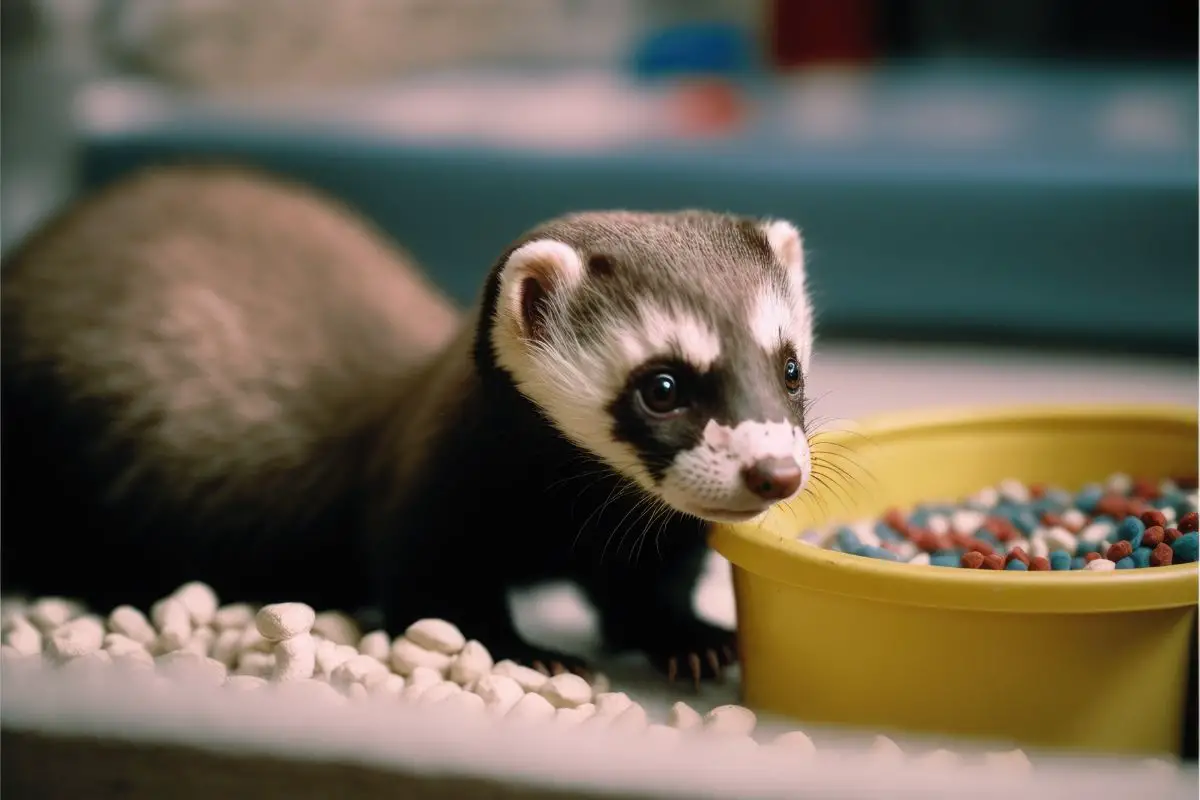Can Ferrets Eat Scrambled Eggs? Here Is The Answer

When you finally bring your ferret home, you must understand what they eat and what they do not. Most first-time ferret owners will largely depend on commercial ferret foods. However, can ferrets eat anything else such as scrambled eggs?
Understand that these creatures are completely carnivorous. However, as you spend more time with your ferret, you might consider changing his diet. There is nothing wrong with this but I advise you to call your vet.
You need to understand the best types of foods that you can substitute with commercial foods. Below, we are going to discuss alternative and homemade meals you may offer your ferret.
Can ferrets eat scrambled eggs?
I have heard this question from a couple of ferret owners so far. I mean, wouldn’t it be wonderful if we could share scrambled eggs breakfast with our ferrets? But how safe is it to feed scrambled eggs to your ferret?
Yes, it is possible to feed scrambled eggs to your ferret. However, as with everything else, you must be moderate.
Before I go on, let us discuss the ferret diet and the foods you should never feed to your ferret.
Complete Nutritional guide for ferrets
As I mentioned above, ferrets are strictly carnivorous. While ferret commercial food serves this purpose, it may not always be available. Understand that it can be high priced as well. So what else can you feed your pet ferret?
Raw diet for ferrets
In your ferret’s natural habitat, he would depend on his hunting for food. Ferrets eat meat and even digested matter from their prey’s guts. Meat is high in proteins and the bones will help clean teeth and gums.
However, at home, it is going to be difficult for your ferret to hunt for himself. You can still feed him meat from home, both raw and cooked. Do not feed him cooked bones as they could shatter and he will end up swallowing them. Before you decide to change your ferret’s diet, then you should speak to your vet.
Raw diet usually works well because it provides nutritious value and it does not contain any carbs. Should you decide to offer your ferret raw eggs, make sure that they are fresh. Also, only offer him the yolk part and separate it from eggwhites.
Other raw foods that may be good for your ferret may include raw chicken necks, mice/rats, liver, and even chicks. Some ferret owners will offer their ferrets prey to hunt. This will meet his need to hunt and provide the required stimulation to keep him happy.
Some advantages that may come with feeding a raw diet to your ferret include:
- The raw diet, as we mentioned earlier, will improve your ferret’s digestion.
- Due to high protein content, a raw diet will also improve the health of your ferret’s coat.
- Feeding prey to your ferret will provide predatory and mental stimulation
- Chewing bones and meet is a great way to exercise his jaws and clean teeth.
Commercial ferret foods
You will still find nutritious ferret foods in the stores. These foods should contain high proteins and fats. Read the ingredients on the wrapper before you get the food.
Most manufacturers use more than 80% chicken or lamb ingredients. However, you may not find commercial foods specifically made for ferrets in a store nearby. You do not have to worry as you can substitute with commercial cat food as it contains high protein content.
Remember that ferrets have a fast metabolism rate and thus digest foods as fast. You will need to feed your ferret for more than 8 times per day.
And because you may not be available to feed him as much, I suggest you get nutritious treats. Ferrets can eat fresh scrambled eggs as a treat.
As I described above, it must be done in moderation. Restrict the number of eggs to two in a week. Alternatively, chicken treats are also healthy for ferrets.
Let’s talk about Ferret allergies
Are ferrets allergic to any foods? Of course, this is a valid question to ask while establishing a ferret diet. Have you noticed any unusual response to the food you are offering your ferret?
Sometimes your ferret can suffer food allergy. This can cause your ferret a painful tummy as a result of bloating. Other physical symptoms of a food allergy are swollen feet and decreased appetite.
Your ferret might also experience irregular bowel movements. Should you leave it untreated, this could lead to intestines hardening or ulcers in his bowel.
Watch out for these symptoms and consult your vet. Once again, should you consider changing your ferret’s diet, I suggest you take it slow. Start by mixing the new food with the old food until his digestive system runs smoothly with the new food.
Foods to avoid feeding your ferret
Now that I have highlighted the types of foods to feed to your ferrets, there are foods you should avoid completely. I cannot emphasize enough that ferrets are carnivores. Therefore, their digestive system is unable to process carbohydrates.
Some of the foods to keep off from include chocolates, avocado, sugary treats, and especially raw eggwhites. When making scrambled eggs for ferrets to eat, you may consider separating the eggwhite and use the yolk.
Also, your ferret should not feed on seeds, fruits, or vegetables. These will be quite indigestible for your ferret.
Baby ferrets should not eat scrambled eggs at all. Instead, stick to the main food and chicken treats.
Feeding your ferret
Earlier on, I mentioned that ferrets need to feed more frequently than most pets due to their fast metabolism rate. So, you must ensure that there is enough food per day in the cage.
To provide total comfort, I advise you to purchase a large cage, preferably a multi-level cage. Ensure that you put some food on each level.
This way, your ferret can always feed freely even when exploring the cage. Besides, a multi-level cage is going to help prevent boredom. The best method of feeding a ferret is free feeding. Leave as much food as you can for your ferret to eat whenever he wants to.
Keep the feeding bowl away from the corners, and especially near the litterboxes. Tie the bowls to the cage to prevent your ferret from tipping it over. Ferrets can enjoy playing with food and making a mess with it.
Switching from ferret food to prey feeding
As your ferret grows older, it could get monotonous feeding on the same thing over again. Maybe you have been feeding him ferret foods all along. There is nothing wrong with that but you might be considering changing his diet. Below, I am going to give you a guide on how to change your ferret’s diet.
The first thing you should keep in mind is that this is going to be a slow process. Besides, you need to be very careful and observant through this process.
If you have been feeding him commercial foods all along, start by mixing the two types of foods. Mix the usual food with your newly proposed diet, which could be raw chicken or meat. Observe how your ferret responds to this change.
Also, ensure that the meat you feed him is fresh, and also frozen. you can always get this from your store. If he responds well, continue feeding him to the mixed foods for a couple of days before you add some more meat and less commercial food.
As I mentioned earlier, this is going to take some time before he makes a complete transition. Remain consistent but stop immediately if your ferret is experiencing an allergic reaction.
If you are planning to give him a completely natural diet, which includes whole prey, then you must be cautious. I advise you to kill the prey first, which may include chicks or mice and rats.
Even though it would be stimulating for your ferret to hunt down prey in the cage, it can be quite messy.
Advantages of whole prey diet for your ferret
One of the major advantages of a whole prey diet is that it provides everything with your ferret needs in his nutrition. It will provide protein and high-fat nutrients, which are essential for his health.
contrary to feeding him dry commercial foods, whole prey provides the moisture needed for your ferret’s foods. Remember that he will feed on everything including the guts.
Whole prey is the same diet your ferret would consume in his natural habitat. This diet will not only contribute to the overall health but also the strength of your pet ferret.
Disadvantages of a whole prey diet for your ferret
Feeding whole prey to your ferret means that you have to get them alive. These may be mice or rats you caught in your home. The prey may have consumed toxic chemicals which may in return hurt your ferret. Therefore, this poses a health hazard as you may not be aware of.
At the same time, prey such as chicks could be carrying bacteria such as Salmonella. Once again, this poses a health threat to your ferret. Besides, it is going to be a difficult task for you to get real prey which makes it inconvenient.
Before you proceed to change your ferret’s diet, you must weigh your options. Make sure you understand ferret nutritional needs and prepare a feeding timetable. Supplement his diet to meet these needs.
Conclusion
In conclusion, ferrets can eat scrambled eggs. However, you should never substitute his meals with eggs. They are perfect for snacks instead. Once you prepare scrambled eggs for him, hand feed your ferret as a treat.
Once again, eggs should only be used in moderation. Stick to one to two eggs per week. Instead, invest in other treats rich in protein. Use chicken or lamb pieces, especially during training periods. Do not feed eggs to a baby ferret at all.
When using eggs for a raw diet, only use the yolk. It has high nutritional value and your ferret is going to love it anyway.
Consult your vet if you are having trouble deciding what to offer your ferret. They can experience an allergic reaction to certain foods. Also, refrain from feeding him fruits, chocolates or vegetables as he cannot digest these foods.
Do not forget to always provide clean drinking water in your ferret’s cage. He will need it to stay hydrated regardless of the diet he is on. Lastly, even though cat foods can be used as ferret food, pay attention to the key ingredients. Only use this option if you cannot find high-quality ferret food in your local store.






